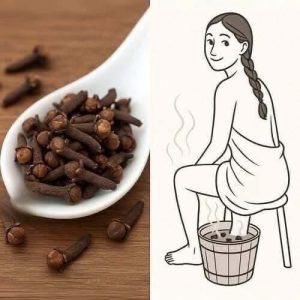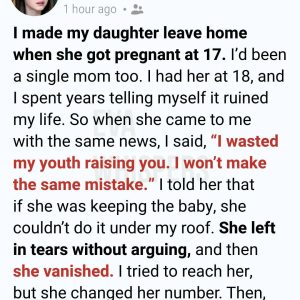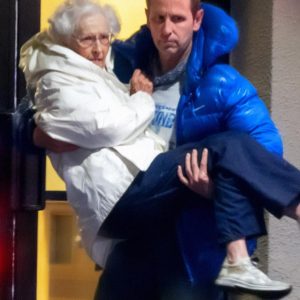After she died, everything narrowed to one purpose: our daughter, Sarah. She was the reason I kept getting out of bed. Holidays, birthdays, decorations — all of it faded into background noise. I simply made sure she was okay while I quietly dragged my grief like an anchor.
When she moved overseas for work, I told her I was proud. I was. But the moment the door clicked shut behind her, the silence rose like water flooding a room. Meals lost their taste. Music lost its warmth. The house felt too big, like a place built for two people and a future that no longer existed.
I was fifty-one that Thanksgiving. Sarah was in Scotland and couldn’t fly home. We had a video call planned for the evening, but the day stretched long and hollow in front of me. The house felt strangely still, as if it were holding its breath.
I stood at the kitchen window with a mug of coffee I didn’t want, hearing Marla’s voice the way I often did on the lonelier mornings.
Stick to a routine, honey. Routine will carry you until your heart can walk by itself again.
So I followed habit. I set down the coffee, grabbed my keys, and reached for the brown jacket Sarah had given me years before. Heavy, warm, a memory in fabric.
Outside, the cold stung my face in a way that felt almost welcome. I walked to the store, moving slow, as if my body were willing the hours to pass more gently. I picked up a rotisserie chicken, rolls, cranberry sauce, a pumpkin pie — the pretense of a holiday meal I knew I probably wouldn’t eat.
Then, walking back toward the parking lot, I saw her.
A woman sat under a bare maple tree near the cart return. No coat. Shoulders drawn tight. Hands tucked under her arms. People streamed past her as if she were invisible. But something tugged at me — maybe Marla, maybe instinct, maybe both.
I walked over quietly. She flinched, as though she expected trouble.
“I’m not here to bother you,” I said. “You just look cold.”
She didn’t answer, just stared at the pavement. Her eyes were tired in a way that went deeper than lack of sleep.
I unzipped my jacket and held it out. “Here. Please.”
She hesitated. Then her fingers — cracked and red — closed around the fabric. I handed her one of the grocery bags too. I scribbled my address on the corner of the pie box.
“If you ever need help,” I said softly, “I’m Eric.”
She whispered “Thank you” so quietly I barely heard it.
That night, I told Sarah I’d eaten. I hadn’t. We talked about her work, her friends, her fireplace. We didn’t talk about the woman under the maple tree or the ache in my chest.
The days rolled into weeks. Then months. Then years — two of them, to be exact. I didn’t forget her, but the memory sank into the same quiet mental drawer where grief keeps company with things too heavy to hold every day.
Then, on another Thanksgiving afternoon, the doorbell rang.
Sarah and her husband, Jake, were home this time, arguing playfully about board game rules. The house smelled like cinnamon and cocoa. A rare warmth.
When I opened the door, I froze.
It was her.
She looked different — well. Her hair was brushed, her coat was clean, her eyes were clear. In her hands, she held a small black backpack.
“Thank goodness,” she said. “I hoped you still lived here.”
I stepped aside immediately. “Are you okay? What do you need?”
She gave me a small smile. “I’m okay. I came to return something.”
Inside the backpack was my brown jacket — folded neatly — and a small wooden box. In the box: a gold-faced wristwatch and a check made out to me for twenty thousand dollars.
“I can’t take this,” I stammered. “I don’t even know your name.”
“My name is Charlotte,” she said. “And I’d like to explain. You saved my life that day.”
We sat around the table, Sarah and Jake listening quietly.
Charlotte told us everything. Two years earlier, she’d been slipping beneath the weight of a marriage to a man named Levi — charming until he wasn’t, manipulative until it became cruelty. He’d slowly convinced her to sign away parts of her inheritance. When she resisted, he framed her for theft at her job. She was fired, blacklisted, humiliated.
Then she miscarried a baby she had barely dared to hope for.
“That Thanksgiving morning,” she said, “I didn’t want to be here anymore. I was trying to choose a way to go that wouldn’t be too awful for whoever found me.”
Her hands trembled on her lap.
“And then you walked over. You didn’t ask what I did wrong. You didn’t look away. You just gave me warmth. Food. And an address. Kindness with no strings attached. And suddenly I realized I didn’t actually want to die — I just didn’t want to hurt anymore.”
Instead of walking into the river, she walked across town to Walter, a retired attorney who’d once been a friend of her father’s. She showed up on his doorstep wearing my jacket.
Walter believed her. Together, they unraveled Levi’s lies. Investigators dug up documents, emails, transactions. The truth cracked open everything Levi had tried to bury. Eventually, he and his mistress were convicted. Charlotte’s name was cleared. Her inheritance restored.
“And the whole time,” she said, “I kept your jacket. I promised that if I ever stood back up, I’d return it not just with thanks, but with something that might matter to someone else. The watch was my father’s. The check is part of my settlement. Use it to help someone who needs a moment of grace the way I did.”
I couldn’t speak.
Later, Charlotte hugged Sarah. Then me. It wasn’t desperate — just warm, steady gratitude.
A year passed.
This Thanksgiving, she sat at our table. She brought sweet potato casserole with toasted marshmallows, just like Marla used to. We laughed about cranberry sauce and board games and burnt rolls.
And when it came time to say what we were thankful for, I looked around the table — at Sarah, Jake, Charlotte — and felt something I hadn’t felt in years.
Hope.
The brown jacket now rests in a wooden box in the hallway beside the watch. A reminder that even the smallest kindness can echo far beyond the moment.
Sometimes, it even comes back to your door — carrying a name, a story, and a second chance.





